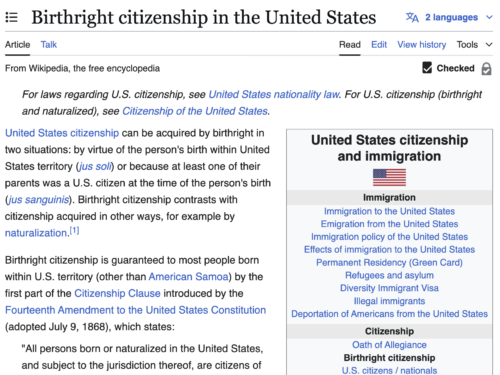As information flows faster than ever and online content feels endless, the spread of misinformation has become one of the most urgent challenges we face. From viral social media posts to manipulated news stories, false or misleading information gains traction quickly, influencing public opinion, shaping political landscapes, and even jeopardizing public health.
But thanks to the support of the Bernard and Audre Rapoport Foundation, postsecondary students across the U.S. and Canada have been busy combating misinformation head on by improving the world’s go-to source of information – Wikipedia!
By filling in gaps in the online encyclopedia through their Wikipedia assignments, student editors ensure that readers have access to more complete, reliable, and high-quality information online. From historic court cases to climate change, birthright citizenship, and more, students brought nearly 10,000 new references and almost one million words to more than 1,200 Wikipedia articles with the support of the Rapoport Foundation this year.

As an easily accessible and trusted source of information, there’s no doubt that Wikipedia helps counteract false narratives and inform decision-making. But on the flipside, when a topic’s Wikipedia article is underdeveloped or simply doesn’t exist, a reader can make inferences based on their preconceptions and inherent biases.
For example, are you familiar with community policing? If not, you’d probably make some inferences about it simply based on its name. Essentially, it’s a model of law enforcement collaborating with community groups and citizens to produce safer and more secure communities – the theory is that it makes citizens more likely to cooperate with the police by improving their perceptions of the police, while also improving the attitudes and accountability of the officers.
While community policing is generally portrayed as an effective alternative to more adversarial models like “broken windows theory”, scholars have raised concerns about both its ethics and efficacy. Thanks to the work of a student in the Criminal Justice Reform course at the University of Massachusetts Dartmouth this fall, much of this critique is now reflected in the Community policing Wikipedia article. By adding this missing perspective, the student editor was able to give readers a broader and more balanced body of information from which to draw their own conclusions about the practice.
The impact of this critical student work on Wikipedia isn’t limited to the content improved; the digital media literacy and research skills developed by the student editors will continue to serve them as they move forward as engaged citizens. Through the process, students learn to identify gaps and misrepresentations in content, explore vast collections of research to accurately summarize topics for the public, and recognize the quality of the sources they find.
“This project demands that students develop critical thinking, digital discernment, and distributed work environment skills through the process of creating knowledge for a global audience,” explained one professor this term.
Echoing this reflection, other fall term instructors explained how the Wikipedia assignment was “an authentic way for students to understand the value of research and use of credible, non-biased sources” and how it “help[s] students distinguish unbiased from biased material, neutral vs promotional material.”
Wiki Education expresses our sincere gratitude to the Rapoport Foundation for their support of this impactful work to combat misinformation and improve public access to accurate and more complete information online.
Interested in incorporating a Wikipedia assignment into your course? Visit teach.wikiedu.org to learn more about the free resources, digital tools, and staff support that Wiki Education offers to postsecondary instructors in the United States and Canada.
